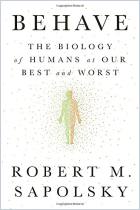
The Elephant in the Brain
Hidden Motives in Everyday Life
Recommendation
Kevin Simler, a blogger and software engineer, and Robin Hanson, an economics professor at George Mason University, present this entertaining study of how people act on and express their hidden motives. Like the so-called elephant in the room that no one talks about even though it is obvious, the “elephant in the brain” is human selfishness. The brain evolved not only to allow people to deceive one another, but to allow people to deceive even themselves. Counterintuitively, the less you know about your own hidden motives, the better you can convince others of your good will. With humor and lively prose, the authors probe the uncomfortable truths that motivate altruistic activities, such as voting and giving to charity. Avoiding outright cynicism, they suggest that selfish motives bring a benefit: cooperation on behalf of social welfare. Their insights will serve readers interested in the behavioral sciences or evolution and those seeking self-understanding.
Summary
About the Authors
Kevin Simler worked as an engineer and product designer for Palantir Technologies. Robin Hanson, PhD, is an associate professor of economics at George Mason University and a research associate at the Future of Humanity Institute of Oxford University.
















Comment on this summary or Начать обсуждение